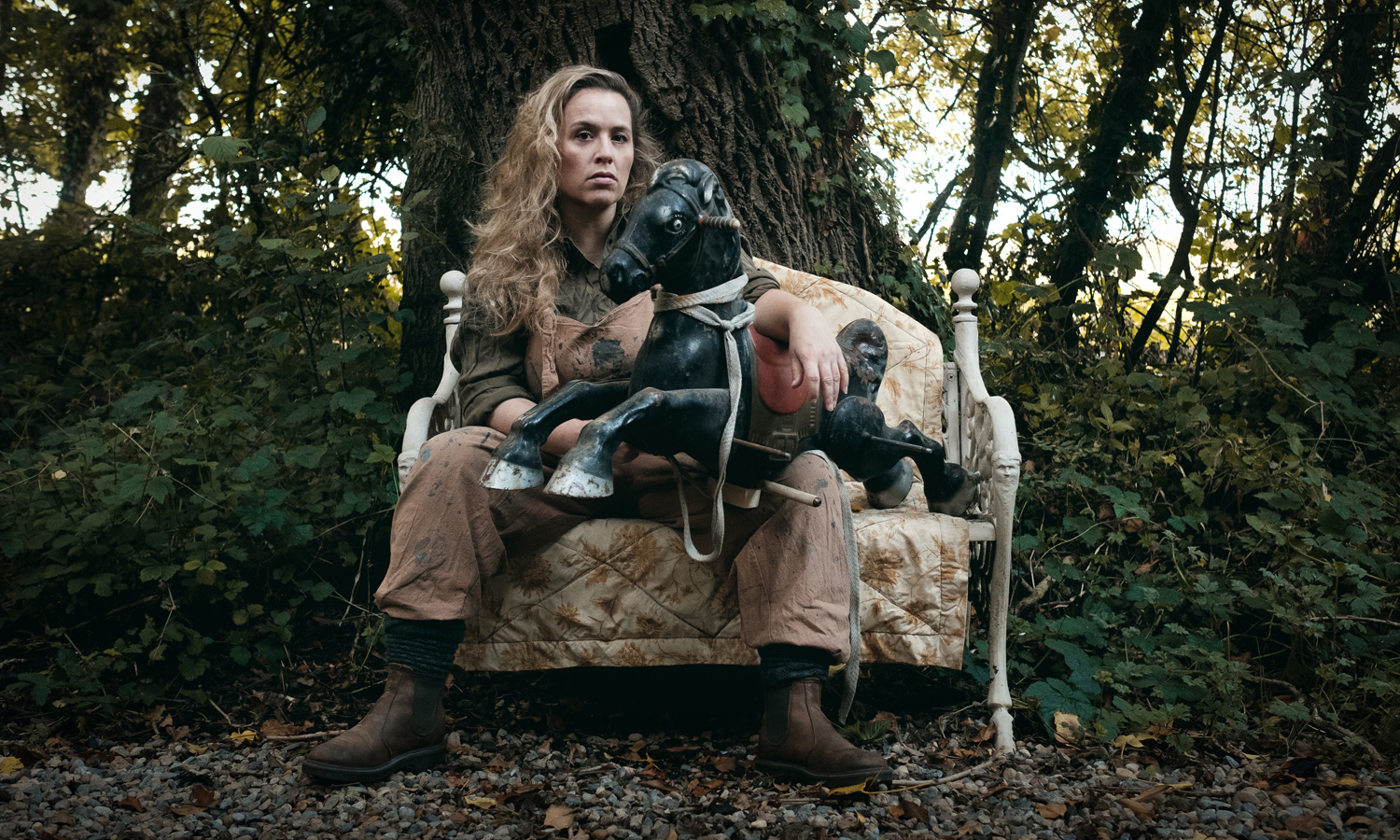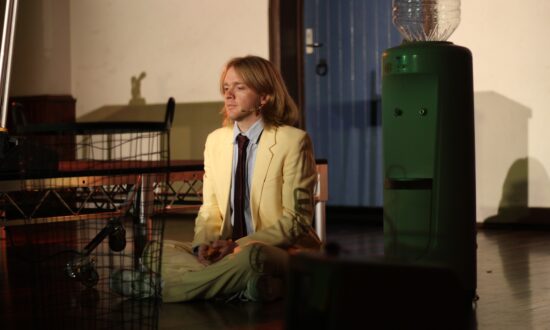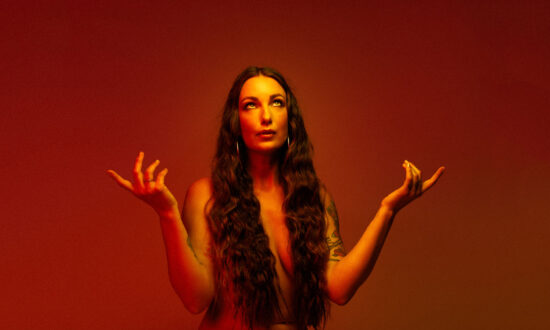“I’m interested in, and angry about, the destructive consequences of a society that teaches women and girls to restrain, diminish or disguise their anger,” says writer and performer Casey Jay Andrews.
Andrews is no stranger to the Adelaide Fringe, or to solo performance. Her previous works The Wild Unfeeling World (2020) and The Archive of Educated Hearts (2019) were both award-winning productions, and this year’s piece, A Place that Belongs To Monsters, looks set to follow suit.
The production is inspired by the biblical tale of the “Four Horsemen of the Apocalypse”.

Performer Casey Jay Andrews.
“In this story the ‘Four Horsemen of the Apocalypse’ – Famine, War, Conquest and Death – are four women at different stages of life: a child, a teenager, a woman in her forties and an elderly lady,” says Andrews.
“I wanted to look at an emotional landscape carved from bottled rage, and question how society perceives anger and fury when you are a woman. How often is a strong-willed girl branded ‘difficult’?
“There is, of course, an infinite tapestry of rage, judgment and gendered societal pressure to be explored that couldn’t possibly fit into 60 minutes, but these four stories each add a small thread to the weave.”
Award-winning South Australian theatre-maker Joanne Hartstone is co-presenting and producing A Place that Belongs To Monsters, and says Andrews has an extraordinary ability to build a visual frame in which to base her storytelling.
“As a designer, a set designer, Illustrator and photographer, and someone who does all sorts of visual arts and has an appreciation of the visuals, Casey has the ability to paint her performance in our mind’s eye, and that’s what always strikes me about her work,” says Hartstone.
“In her last work, I could just see the colours in her words and, honestly, she was painting in my brain.”
Andrews says she loves to write in a way that “invites the audience on a highly visual journey, as if stepping inside a book”.
“I always hope each person leaves with their own vivid landscape of the story,” she adds. “I love building an informal relationship with an audience; in a solo show, there is something extremely direct about the exchange.”
Andrews is also pleased that her Adelaide Fringe venue is the courtyard at Treasury 1860: “This is storytelling as I love it most – outside, under the stars.”
Hartstone is also co-presenting Irish playwright and performer Eva O’Connor’s Adelaide Fringe solo show Mustard, which was another sell-out in Edinburgh.
“Eva is a wordsmith,” Hartstone says of O’Connor, who was last in Adelaide in 2017 with My Name is Saoirse.
“I think it’s also because of her heritage, her Irish ability to tell a story, and the way that she weaves emotion in the language. Then the vulnerability in which she tells those stories is remarkable.
“She becomes whatever emotional building blocks she’s placing in front of you.”
Mustard will present a number of these “building blocks”.

Eva O’Connor is presenting Mustard at Holden Street Theatres. Photo: Eimear Reilly
“I wanted to explore the feelings of shame and secrecy that people experience when they are coping with something like an eating disorder – or a mustard addiction!” says O’Connor.
The hour-long production – showing now at Holden Street Theatres – is a darkly comic play that delves into the themes of heartbreak, madness and coping mechanisms.
“I wanted to play with mustard as a metaphor,” O’Connor explains. “Some of the themes of the show are quite dark but the mustard elevates it into the strange and intriguing, I think.”
Mustard has been said to straddle the line between theatre and performance art, a dynamic that was unintentional, but evolved through the development process and under the guidance of director Hildegard Ryan.
“It actually starts very simply and humbly and then through her, these visuals are created of the person obsessed with mustard, bathing and mustard, what that looks like,” says Hartstone, who saw the show in 2019.
O’Connor says the “strange arty-ness” of the Mustard came later in development process.
“When I’m first creating a show, I’m never thinking ahead to the end product. Initially it’s always a bit of a mystery in terms of what form the piece will take.”
being on stage alone can be quite daunting, depending on the day!
While O’Connor has been performing Mustard since 2019, she says the nature of the production, and its heavy subject matter, means it demands a great deal from her, particularly as a solo performer.
“I love performing Mustard. Although I’ve done several runs of the show, it’s still a real challenge every time I do it… it takes a lot of energy and being on stage alone can be quite daunting, depending on the day!
“But it’s a real privilege to get to do what I love, and I get a real buzz from it every time. I love watching audiences’ responses, and the different ways people read into the show.”
Hartstone believes there is something special about female stories, which are often “the unsung stories – a bit newer”.
“They are so rich. You say ‘female performer’, but actually the range of what that means is so vast. It’s a discovery every single time.”

Morna Burdon was inspired by both her mother and historical women figures for her Fringe show Bonnie Fechters.
If there is one production that exemplifies the idea of unsung stories and the history of female struggle and resilience, it is Bonnie Fechters.
“A ‘bonnie fechter’ [in Scotland] is a fearless fighter – someone who stands up for what they believe in,” says Morna Burdon, the creator and performer of the one-woman show, which will have an Adelaide Fringe at The Warehouse in Unley.
Burdon says her mother was the initial inspiration for the production, which also had immense success in Edinburgh.
“My mum came from Dundee in Scotland, which was known as the ‘women’s city’ and is full of bonnie fechters. She used to say about a woman she was telling a story about, ‘She was bonnie fechter’.
“And Mum also loved singing,” she adds, accounting for the songs woven through the show.
“The songs are sung without accompaniment because that is how most of them were originally sung. There are political songs, protest songs, inspiring songs, traditional songs. Many are about struggle, survival, hope, encouragement. Like the stories, they feature ordinary women facing extraordinary challenges.”
Aside from her mother, Burdon also found inspiration in historical figures and research.
“There was a handwritten transcript I came across of an interview with a suffragette. It was hidden away in an archive. She was nine when she used to march in front of demonstrations playing her bagpipes and changing the world.
“I wanted to bring these stories to light and I keep it very simple. I just tell the stories, sing the songs and the rest is between the audience and what they hear and how they respond to that.”
When researching for the production, Burdon traversed eras, countries and characters, and has worked all of this into her writing.
“I kept coming across links – for example, a story about a famous factory strike in the USA happening in the same year that the writer of a song about factory conditions started work in a Scottish jute mill,’ says Burdon.
“I name over 50 women in just over 50 minutes. They are all real people. There is no one single hero because there are endless heroes and all our stories matter. They are our heritage – who we are.”
Burdon says the single storyteller approach encourages an intimacy between performer and audience.
“It allows me to talk directly to the audience, and the same with the songs. I enjoy the simplicity and connection. One lovely surprise was how keen people were to tell their own stories about bonnie fechters in their own lives. Our stories matter.”

Get InReview in your inbox – free each Saturday. Local arts and culture – covered.
Thanks for signing up to the InReview newsletter.
A Place That Belongs To Monsters is at the Courtyard from March 2-12. Mustard is at The Arch at Holden Street Theatres from February 15-25. Bonnie Fechters is at the Warehouse Theatre from February 17 until March 5.
This story is part of a series of articles being produced with the support of Adelaide Fringe. Read more 2023 Fringe stories here.
Support local arts journalism
Your support will help us continue the important work of InReview in publishing free professional journalism that celebrates, interrogates and amplifies arts and culture in South Australia.
Donate Here




